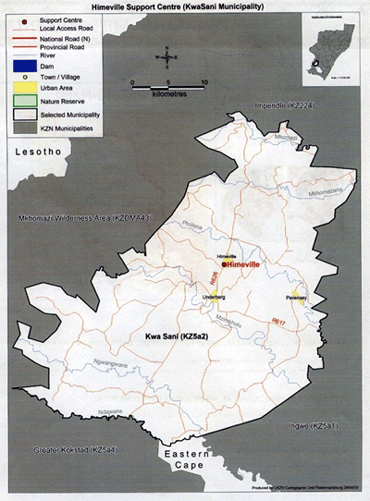
Coordinator: Sindi Mjoli. Sindi has worked for CCJ since 2011.
Contact: 033 702 1615
Email: ccj.himeville@gmail.com
District: Sisonke Municipal District (Midlands KwaZulu-Natal)
Area: 1,180 sq km
Population: 15,309
Most common cases: Domestic violence and labour issues
Areas served: Loteni, Nhlathimbe, Goxhill, Stepmore, Stoffelton, Mqhatsheni, Drakensberg, Pevensy, eMakholweni, Underberg settlement, Himeville settlement, KwaPitela, Sani Pass, Evart, Ndawana, Bushmansneck and Ridge communities.

Description: The support centre (above) is situated in the small village of Himeville, five kilometres outside Underberg. The office is on the police premises and is accessible for town residents but less so for rural people: transport is scarce and expensive, and the only access is by a bad gravel road. Transport is available twice a day, one taxi in the morning towards town and the return transport in the afternoon.
People from the surrounding rural areas work on farms to make a living, and traditional leaders are powerful. Accessing facilities such as ambulance services, electricity, clean water and sanitation is hard. In 2011 the office dealt with 181 cases, with domestic violence (64) and legal advice (50) being the most common.
Sindi Mjoli
How long have you worked for CCJ?
Since 2011
What led you to work for CCJ?
My dream was always to be a social worker, but because of financial difficulties I couldn’t study for that. I grew up as an orphan and l always wanted to help children. I heard about the centre from a friend who visited it with a problem.
What are the most common cases that you deal with?
Most problems are ID problems. Parents pass away and leave children with no documents like birth certificates. They go to Home Affairs but the local officials don’t have the correct information. I give them referral letters for Home Affairs explaining the law and what they need, and this helps them to get their documents.
The other common cases are of maintenance. I find that people get help with maintenance from the courts but after about three months one party stops paying, and the other person comes to me for help. I contact the Maintenance Office for them, and they take up the matter and get the payment started again.
“The social workers told me to come back later and for two days they didn’t help. So I took the child on my back to the shelter without the paperwork."
|
What advice would you give children growing up in Himeville?
I would say stay away from drugs and sex so that your future can be bright.
Who is your role model?
One of my relatives. The way he looks after our family and other people, he lays his life down for others.
Do you ever use traditional laws to solve your problems?
Sometimes there is a small problem where the law can’t help, and we refer those cases to others. For example, a woman came here asking for compensation from someone who accused her of bewitching them. She wanted two cows as compensation. I couldn’t help her so I referred her to the traditional court.
Is there a law that you feel should be changed?
It is the child support grant. I would give the grant to the grannies because youngsters do their own things with the money and the children are suffering. I would pay the grant as food vouchers, and make sure there are more mobile clinics to treat the children so that the mothers don’t need the money to travel to clinics.
Has the behaviour of people in your area changed in the time you have worked there?
Yes, a little bit. There is less domestic violence now. At first only women reported their problems. Now men also come, usually to complain about their wives. Instead of just hitting them, they come to me first.
What are the particular challenges that you face in your work? (Below) Outside Himeville
Himeville
Transport is the main one. Often we get calls to go to people’s houses to help someone, but we cannot get there quickly or sometimes even until the next day. We rely on lifts from the police, and sometimes we can’t get them when we want.
Is there a case that you remember that was especially rewarding?
There was a baby, ten months old. His neighbours called me to say they had heard a child crying all night. I went there in the morning and saw this baby boy on the floor crying. His parents had abandoned him and there were people sitting around it laughing and saying ‘Where are your parents?’ I asked them why they didn’t help and they said that they didn’t know who the parents are. I called the community health worker and asked her to keep the child for the night because I already had two children in my home, an abused child and my own. The health worker agreed.
I bought food for the child and went to the Department of Social Development and asked a social worker to do the paperwork so that the child could be admitted to a place of safety, a private shelter. The social workers told me to come back later and for two days they didn’t help. So I took the child on my back to the shelter without the paperwork. The woman who runs the shelter was extremely friendly and took the child in. I visited the baby two days later and was happy – it was clean and had new clothes. It was later sent to a good school. I always visit the centre to see how the child is. It’s two and a half years old now.